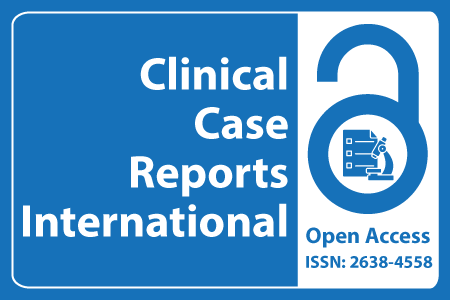
Journal Basic Info
- Impact Factor: 0.285**
- H-Index: 6
- ISSN: 2638-4558
- DOI: 10.25107/2638-4558
Major Scope
- Sports Medicine
- Cardiac Surgery
- ENT
- Lung Cancer
- Genetics
- Pain Management
- Nursing
- Respiratory Medicine
Abstract
Citation: Clin Case Rep Int. 2024;8(1):1669.DOI: 10.25107/2638-4558.1669
Associations between Psychosocial Findings and Quality of Life One Year after Primary Treatment for Common Types of Cancer: A Multicenter Observational Study on Patient- Reported Outcomes
Baier P, Bauer C, Löhnert M, Maier S, Hartung E, Schlembach U, Drognitz O, Deschler- Baier B
Department of Surgery, Caritas Krankenhaus Bad Mergentheim, Germany
Institute for Clinical Epidemiology and Biometry, Julius-Maximilians-Universität Würzburg, Germany
Department of Surgery, University of Bielefeld Campus Klinikum Bielefeld, Germany
Department of Surgery, Kliniken Ostallgäu-Kaufbeuren, Germany
Department of Internal Medicine, Caritas Krankenhaus Bad Mergentheim, Germany
Department of Gynecology, Caritas Krankenhaus Bad Mergentheim, Germany
Department of Surgery, ViDia Hospital Karlsruhe, Germany
Comprehensive Cancer Center Mainfranken, University Hospital Würzburg, Germany
*Correspondance to: Barbara Deschler-Baier
PDF Full Text Research Article | Open Access
Abstract:
Background: Cancer patients suffer from a significant number of psychosocial challenges related to disease or straining treatments. As more are surviving cancer and its treatment, we aimed to explore associations between psychosocial topics, selected physical and treatment-related variables with health-related Quality of Life (QOL) one year after initial diagnosis and curative treatment of common types of cancer. The main goal was to identify factors that are relevant to patients’ QOL and generate hypotheses to address modifiable factors by focused interventions. Methods: In this prospective observational study, we used standardized, validated questionnaires to assess psychosocial topics pre- and 1-year post-cancer treatment and to investigate their impact on global QOL (EORTC QLQ-C30): Anxiety and depression, hope, social support, religion and spirituality, coping, resilience and a selected number of clinical parameters and symptoms. Uni- and multi-variate analyses for risk prediction were performed. Results: This study included 297 patients (median age 66 years (± 11.9)) of whom 170 could be reached for follow-up. The most frequent diagnosis was gastro-intestinal cancer (n=121; 40.7%). While median global QOL was stable after one year across the entire patient population, there were clinically significant changes in values of single items (e.g. fatigue, physical and role functioning). A general deterioration of QOL was observed in 55/170 (35%) patients and 39/170 (25%) experienced a decline of more than 10 points. Multimodal treatment including chemotherapy was the single parameter that bore a high risk for poor subjective outcomes (p=0.0001). Further, multivariate analyses revealed that those who experienced a change in one of three parameters (i.e. anxiety, resilience or functionality) during the year of observation were at highest risk to experience a decrease in QOL. Conclusion: Baseline psychosocial and clinical assessment data do not sufficiently predict for poor outcome while an adverse change in anxiety, resilience or functionality seems to endanger QOL. Patients whose treatment concepts include chemotherapy are at highest risk for reduced QOL. We suggest prospective randomized interventional studies with focused support beyond standard aftercare to improve the quality of survivorship. This will reveal important information on how to plan support, education, and counselling for a growing group of cancer survivors. Trial registration: DRKS-ID: DRKS00010674. Registered on 05.07.2016.
Keywords:
Psychosocial factors; Cancer patients; Curative treatment; Patient-reported outcomes
Cite the Article:
Baier P, Bauer C, Löhnert M, Maier S, Hartung E, Schlembach U, et al. Associations between Psychosocial Findings and Quality of Life One Year after Primary Treatment for Common Types of Cancer: A Multicenter Observational Study on Patient- Reported Outcomes. Clin Case Rep Int. 2024; 8: 1669.













